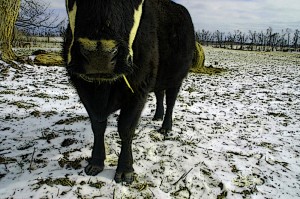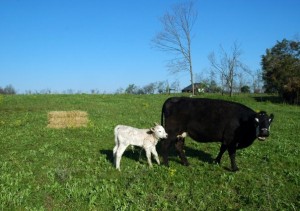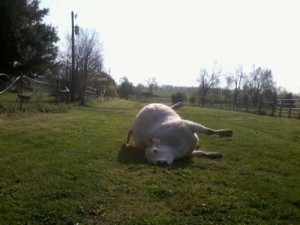
Heather and the kids were at the beach all last week. While I missed them dearly and eagerly awaited their return, I will say that it is also true that I reveled in being a bachelor and having the place to myself. But bad things tend to happen on the farm when I’m on my own.
When Friday dawned, I pondered my options for the coming day. Golf? Maybe a drive to Louisville or Lexington? Or perhaps visit a distillery? Be a nice day trip to Clermont, Loretto, Bardstown…
All that evaporated the moment I walked out to the pasture, coffee mug in hand, and came upon a commotion: the entire herd clustered around and nosing at a cow down on her side. I could see from the gate she had bloated. Her left side was grotesquely distended. It’s common to describe a bloated bovine as having blown up like a balloon. This is not an exaggeration.
I tried to stand the 1500-pound cow up. By myself. Futility. I started calling neighbors for help, left a few messages, and then got the vet assistant to pick up. He told me to get a hose down her to let off some of the gas. ASAP. Two years ago I had a heifer die of bloat a couple of hours after being turned out into a fresh clover paddock. (As it turns out, that heifer was the calf of the cow in question. A major aha! re the common genetics, but a little late to be useful).

So I cut off a length of my garden hose and ran out to the cow, who was lying in mud, eyes rolled back in her head. I eased the hose (as easily as one can) down her throat. Enter my neighbor Mike, a seasoned cattleman of the old school, who told me the hose I was using was too flexible. I ran back to the house and cut a section of PE pipe, and ran back to the cow. No, Mike said, too stiff. So back to the house to cut a third section of hose, satisfactory to Mike, and we worked it down together. My job was to listen for the gas to see if we had the hose in the stomach. At one point I said I was not sure, and he asked me to hold it up so he could hear. When I did, a good-sized stream of bile and foam squirted into his ear. He took it in stride, and patiently explained that it was probably a good idea to hold the end of the hose NEXT to the ear. Ever the slow learner, five minutes later I had a pint of the same stuff running down my neck.
The cow’s left side was coming down some and she was able to breathe a little easier. Her eyes were closed, no longer rolled back. The next thing was to get her stood up, but in the mud that proved to be an impossible task, even after we were joined by my brother-in-law Tom. We wrapped a chain around her neck and tried to pull her up tug-of-war style, to no avail. Then we attached the chain to the hitch of Mike’s truck. We got her sitting, tucked her legs under her, and for just a second had her on her feet. Then she toppled over on to her right side. We repeated this comic routine for another 45 minutes. I was the last to realize this was not going to work.
“Well, you could beef her.”
I hated the idea. Number 19 (her tag long since rubbed off on a T-post) was the last left alive of the first five cows I had bought to start the herd, and the first one to calve. She was a bossy old thing, probably the herd’s alpha cow, and I was kind of fond of her. But the consensus was that she was never getting up and I had to make a quick decision. Either take her for meat or call the Dead Truck.
We called a few local small processors. Not one was willing to come kill and quarter her in the pasture on such short notice. And apparently no processor is allowed (or willing) to hang and butcher halves or quarters of beeves they hadn’t killed themselves.
Another neighbor, Albert, had appeared, and Mike soon somehow managed to volunteer Albert for the job of killing and butchering the cow. Albert was less than keen at first, but he started talking it through. He said give me half an hour for lunch and if you haven’t figured anything else out, give me a call.
Albert had grown up on a farm, and had a business raising and training walking horses. Previously he had worked as a nuclear physicist for the military. We had a bit of shared bond as (over)educated farmers and outsiders, having arrived in central Kentucky from different places. He from Kansas, I from Minnesota. And it turns out he had worked in a butcher shop as a teenager. Between his skill set and my pristine copy of Basic Butchering of Livestock & Game, we could make a go of it.
So in the early afternoon Albert came and did the deed. We made idle conversation as the cow bled out, and that is never a pleasant thing to be near. Albert then chained the rear legs to the hay fork on his John Deere and hoisted the once-cow/now-carcass over to a grove of trees in front of the barn, out of the howling and at times bitter wind. Albert had asked his friend Brian, a fellow horseman, to join us, and he was strong, energetic and clever, an indispensable addition. The skinning and quartering of a 1500-pound animal is a big undertaking at any time, especially as we lacked certain power tools that would have made the job much easier. We had to take turns with a meat saw to bisect the thing. I continued to consult The Book. Dissect the bung, and tie it off with a piece of string. Each turned page had another smear of blood.
Having split the carcass, Albert drove the tractor to our back yard, where we commandeered our picnic table and an old sheet for the butchering. We worked at that from 4 til well after dark. Albert had the butchering skills, Brian and Tom, both hunters, applied their experience with deer to the larger animal, and I … well, I assisted in whatever ways I could. Mike said he had a powerful meat grinder, which was excellent news, but when we went to get it, we weren’t sure what to make of it. Someone, a cousin of Mike’s, had taken an old hand-cranked grinder, bolted it to a piece of barn timber, and attached a motor. It took us some time to assemble it and to gauge the amount of meat we could feed into it without making it grind to a halt. We soon realized that when it choked we could just manually spin the wheel, minding our fingers, to force stuck pieces of meat or fat through. My skills being on the low end of the hierarchy, I was on hamburger duty while the others separated the carcass into primal cuts and found the parts that might produce steaks.
“Do you care about the short ribs?” When I said I might want some, we had to find a way to cut them up. I remembered my circular saw, and set to cleaning the wood and cobwebs off. It spat flecks of beef all over the place, but was pretty useful in cutting up the ribs.
We had to stop when it was completely dark, and improvised ways to store the meat away from our dog and cats and whatever else might wander into the yard, attracted to the smell.
Saturday morning, while I was waiting for the others to show up, I observed the cows getting nutty: the scent of the blood got the entire herd into a crazy state. There was a lot of head butting and full-tilt sprinting across the pasture, and much bellowing. The bull, usually the mellowest of animals, was frantic. It was an awe-inspiring and slightly intimidating scene.
A little before noon Tom and Albert came back to finish the butchering. We worked pretty much nonstop through the afternoon into the evening. The first Final Four game between UConn and Florida was midway through the first half when we had finally packed both my chest freezers full and sent off a crate with Albert.
The work was hard and constant but we were all in good humor through both days. Albert said he probably would not have taken on the job if he had known what was involved, and I think we all agreed with that. I said I might be calling you again, knowing what all you can do. He said, I’ll be sure not to pick up the phone when I see your name and number.
Early Saturday afternoon I seared a big brisket on the grill and stuck it into the oven to braise. Tom threw four strip steaks onto the grill, and we broke for lunch. I guess I had been apprehensive about actually eating this meat from a mature cow, meat that we had no way to properly age. But the steaks tasted amazing, as did the brisket, which we ate as we watched the Wildcats win yet another game with a last-second Aaron Harrison shot.
And last (Sunday) night came the true test, when I served up old number 19 to the wife and children. I had fears they would resist on sentimental grounds, or would think the meat tasted funny, and I would be stuck with two chest freezers full of beef I would have to eat myself. Fears unfounded, all three of them wanted a second helping!
I could easily insert some Wendell Berry-esque reflections on the nature of community and work, and they would be appropriate. But I’ve been out here in the country for over a decade now, and I am somewhat ambivalent about Mr. Berry. Sometimes (often) I give thanks and praise for his soul and wisdom. Bless His Heart. I really do think he is the Greatest Living Kentuckian, if not in the running for Greatest Living American. But for me there are other times when it’s Goddamn Wendell Berry for getting me into this farming life. I know it’s not his fault. I’m coming to realize now that I lack many, or most, of the attributes necessary to become a good farmer, and am too scattered, too corrupted by modernity, too fond of bourbon and rock n roll and sleeping in and watching basketball all night while reading Vogue magazine. Lack of self-knowledge. That’s on me. I’m fairly sure Wendell might find me a peculiar kind of farmer if ever we met.
This weekend my farming adventure came together in a very Berry way, though, and ended well. Until the next farming catastrophe, it will be Wendell, Bless His Heart.




